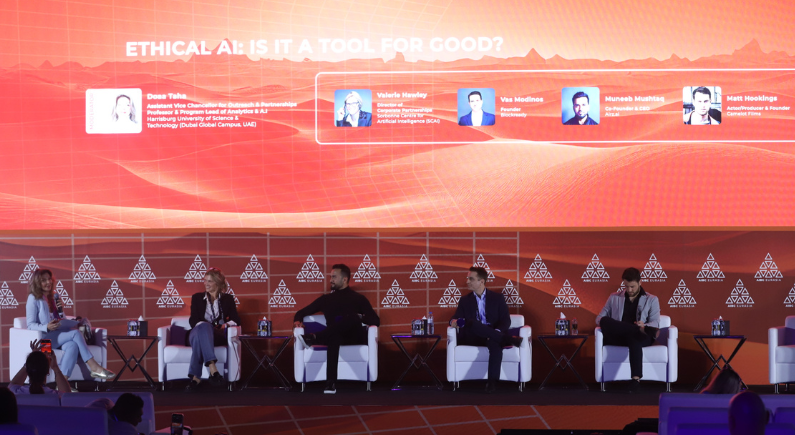Ethical AI: Weighing whether it is a tool for good or not

Artificial Intelligence (AI) has seen rapid growth and adoption in the past few years. With the rapid advancement of technology come ethical concerns, underscoring the importance of responsible and ethical practices.
In a panel moderated by Doaa Taha of Harrisburg University of Science & Technology at AIBC Eurasia 2024 happening in Dubai, leaders from different industries weigh in on how AI can be used as a tool for good.
Taha noted that ethics is relevant with the rise in all technologies of nefarious use and applications.
“Of course, it all depends on how technology is harnessed as to its applications for good or to foster problems as in any other realm of human activity,” Taha said.
“It is clear that some of the antidotes to nefarious use lie within AI itself, and that it is clear that elements such as blockchain have afforded technological tools toward transparent monitoring of data-driven transactions, even if there is no silver bullet to making digital technologies and AI a universal, safe, and ethical domain,” she added.
Regulating AI
Just this month, the Council of the EU Ministers unanimously approved the Artificial Intelligence Act, a framework based on regulating the technology by risk.
Panel member Valerie Hawley of the Sorbonne Centre for Artificial Intelligence (SCAI) shared that this regulatory development only shows that ethics should be part of AI use.
“Ethics and regulation is very much at the core of the AI community,” Hawley said. “When we talk about ethics, there is obviously the regulatory aspect, but ethics goes beyond regulation.”
“What we see is that everywhere in the AI community, there is a set of best practices that are being put in place so that we make sure that the models are not going to be completely deviant.”
The use of AI in the film industry
Also participating in the panel discussion is Matt Hookings, an actor/Producer and Founder of Camelot Films, who shared that his production company used AI in filming his next film entitled The Lost Book of Creation.
“There’s lots of tools that we’re using at the moment to help develop the next stage into production,” Hookings said. “So, we are using apps such as Midjourney and Storyboard.ai to really build the world of the film that we’re creating. So, it’s very useful. It’s very powerful.”
While Hookings expressed his enthusiasm about the technology, he admitted that he’s also nervous about how this would impact jobs in the film industry as AI becomes more sophisticated.
“So in my industry – film, I’m a little bit nervous because there’s a lot of ways that it could affect jobs,” he said.
“There is a slight nervous side to where actors and filming and everything is just not going to be needed because it’s all going to be generated through a computer.”
AI in education
Meanwhile, Vas Modinos, Founder of Blockready, detailed how AI can be used in the education sector.
“We at Blockready try to marry education with AI because it brings so many different advantages when it comes down to learning,” Modinos said.
Blockready is an educational platform that uses AI to help anyone entering the blockchain and cryptocurrency field avoid pitfalls and to provide a structured path to their learning.
Modinos shared three ways that his firm is using AI in education, these are for personalization, research, and content generation.
However, he also shared several challenges in integrating AI use in the education sector such as privacy, integrating algorithms into systems, and ensuring there’s no AI divide among educators.
Utilising AI in the wellness industry
Another panel member, Muneeb Mushtaq, Founder & CEO of Airz.ai, shared how his company is utilising AI technology for wellness.
“We have AI technology not only in our software side where we’re doing AI wellness coach,” Mushtaq shared. “We’re tracking the mood and then we’re doing API integrations from the Apple watch.
Airz.ai is a company developing smart home fragrance technology aimed at enhancing well-being through scents.
“We’re building AI-generated fragrances. So there is not even human intervention, they’re generated by AI,” he said.






